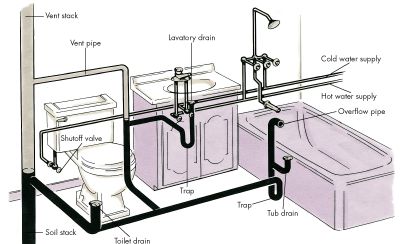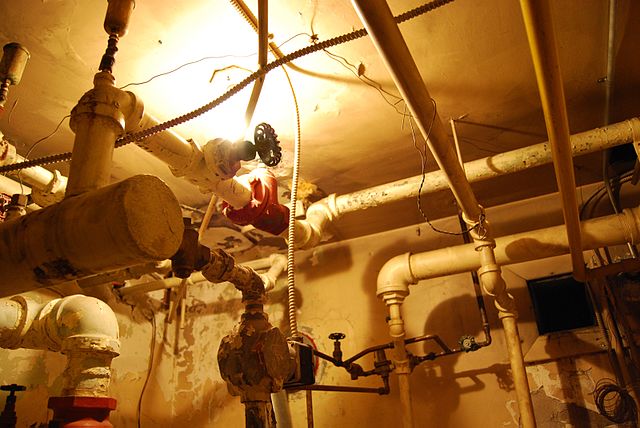Examining Your Property's Plumbing System Anatomy
Examining Your Property's Plumbing System Anatomy
Blog Article
What are your ideas concerning Anatomy of a House: Understanding the Components?

Recognizing exactly how your home's plumbing system works is vital for every single property owner. From providing clean water for drinking, cooking, and showering to safely getting rid of wastewater, a properly maintained plumbing system is critical for your household's wellness and comfort. In this extensive guide, we'll explore the detailed network that makes up your home's plumbing and offer tips on upkeep, upgrades, and taking care of usual problems.
Introduction
Your home's plumbing system is more than simply a network of pipelines; it's a complicated system that guarantees you have accessibility to tidy water and effective wastewater removal. Recognizing its parts and how they interact can assist you avoid costly fixings and guarantee everything runs efficiently.
Basic Elements of a Pipes System
Pipes and Tubing
At the heart of your pipes system are the pipes and tubing that lug water throughout your home. These can be made of numerous materials such as copper, PVC, or PEX, each with its benefits in terms of toughness and cost-effectiveness.
Fixtures: Sinks, Toilets, Showers, and so on.
Fixtures like sinks, bathrooms, showers, and bathtubs are where water is utilized in your house. Comprehending exactly how these components connect to the pipes system helps in identifying issues and intending upgrades.
Valves and Shut-off Points
Valves control the circulation of water in your pipes system. Shut-off shutoffs are vital during emergencies or when you need to make repair services, allowing you to isolate parts of the system without disrupting water circulation to the entire home.
Water Supply System
Main Water Line
The major water line connects your home to the metropolitan supply of water or an exclusive well. It's where water enters your home and is distributed to numerous components.
Water Meter and Stress Regulatory Authority
The water meter steps your water use, while a stress regulator guarantees that water streams at a risk-free stress throughout your home's plumbing system, avoiding damage to pipelines and components.
Cold Water vs. Warm water Lines
Understanding the distinction in between cold water lines, which provide water straight from the main, and hot water lines, which bring warmed water from the hot water heater, aids in troubleshooting and planning for upgrades.
Drain System
Drain Water Lines and Traps
Drain pipelines carry wastewater far from sinks, showers, and commodes to the sewer or sewage-disposal tank. Catches prevent sewer gases from entering your home and likewise catch debris that could trigger obstructions.
Ventilation Pipes
Air flow pipes permit air right into the drainage system, avoiding suction that can slow drainage and trigger catches to vacant. Proper ventilation is necessary for keeping the integrity of your plumbing system.
Value of Correct Drainage
Guaranteeing proper drainage stops back-ups and water damages. Regularly cleansing drains and preserving catches can protect against costly repairs and extend the life of your plumbing system.
Water Heating Unit
Kinds Of Hot Water Heater
Hot water heater can be tankless or traditional tank-style. Tankless heating systems warmth water on demand, while tanks store heated water for immediate use.
Upgrading Your Pipes System
Reasons for Upgrading
Updating to water-efficient components or changing old pipes can enhance water high quality, lower water expenses, and raise the value of your home.
Modern Plumbing Technologies and Their Benefits
Check out modern technologies like clever leak detectors, water-saving toilets, and energy-efficient water heaters that can save cash and lower environmental effect.
Price Considerations and ROI
Calculate the in advance prices versus long-term cost savings when taking into consideration pipes upgrades. Numerous upgrades pay for themselves with lowered utility costs and less fixings.
Just How Water Heaters Connect to the Plumbing System
Understanding how water heaters connect to both the cold water supply and hot water distribution lines helps in diagnosing problems like inadequate hot water or leaks.
Maintenance Tips for Water Heaters
Frequently purging your hot water heater to eliminate sediment, inspecting the temperature settings, and examining for leaks can extend its lifespan and boost power performance.
Typical Pipes Problems
Leaks and Their Causes
Leaks can occur due to aging pipelines, loose installations, or high water pressure. Resolving leakages promptly prevents water damages and mold and mildew growth.
Obstructions and Obstructions
Clogs in drains pipes and bathrooms are typically brought on by purging non-flushable products or a build-up of grease and hair. Using drainpipe screens and being mindful of what drops your drains can protect against blockages.
Signs of Pipes Issues to Expect
Low water stress, sluggish drains pipes, foul odors, or uncommonly high water bills are indicators of potential pipes issues that need to be attended to without delay.
Plumbing Upkeep Tips
Routine Inspections and Checks
Arrange yearly plumbing assessments to catch concerns early. Look for indicators of leaks, rust, or mineral buildup in faucets and showerheads.
Do It Yourself Maintenance Tasks
Basic tasks like cleansing faucet aerators, looking for bathroom leaks making use of dye tablet computers, or protecting exposed pipes in cold environments can avoid significant plumbing concerns.
When to Call an Expert Plumber
Know when a pipes issue calls for specialist knowledge. Attempting intricate repair services without proper understanding can bring about more damages and greater repair service expenses.
Tips for Reducing Water Usage
Basic habits like fixing leaks without delay, taking much shorter showers, and running full loads of laundry and recipes can preserve water and lower your utility bills.
Eco-Friendly Pipes Options
Take into consideration lasting pipes materials like bamboo for flooring, which is durable and environment-friendly, or recycled glass for counter tops.
Emergency situation Readiness
Actions to Take Throughout a Pipes Emergency
Know where your shut-off shutoffs lie and exactly how to shut off the water in case of a ruptured pipeline or significant leak.
Value of Having Emergency Contacts Handy
Keep call information for local plumbers or emergency situation solutions easily available for fast feedback throughout a plumbing situation.
Ecological Influence and Preservation
Water-Saving Components and Appliances
Installing low-flow faucets, showerheads, and toilets can dramatically minimize water usage without sacrificing performance.
Do It Yourself Emergency Situation Fixes (When Suitable).
Short-term solutions like making use of air duct tape to spot a dripping pipe or positioning a container under a dripping tap can lessen damage till an expert plumbing arrives.
Conclusion.
Recognizing the makeup of your home's pipes system equips you to maintain it effectively, conserving time and money on repair work. By complying with regular maintenance routines and staying educated regarding modern pipes innovations, you can ensure your pipes system operates successfully for many years ahead.
The Anatomy of Your Home s Plumbing System
Understanding the anatomy of your home s plumbing system is essential for any homeowner. It not only helps in identifying potential issues but also facilitates effective communication with professionals when repairs or upgrades are needed. Your home s plumbing system is more than just pipes and faucets; it s a complex network that ensures the efficient and hygienic flow of water in and out of your house. In this blog, we ll dissect the crucial components of your home s plumbing system. For those in Antelope Valley, Brock Plumbing is your trusted partner for all your plumbing needs, ensuring your system functions smoothly and efficiently.
Water Supply System
Main Water Line: This is where your home s plumbing system begins. The main water line connects your home to the public water supply or a private well. Pipes and Shut-off Valves: Pipes distribute water throughout your home. Shut-off valves are crucial for controlling the flow of water and making repairs without shutting off the entire system. Drainage System
Drain Pipes: These pipes carry waste and water away from sinks, toilets, and showers. Vents: Vents allow sewer gases to escape and help maintain proper pressure in the drainage pipes, ensuring efficient flow of wastewater. Traps: Every fixture has a trap, a U-shaped pipe that holds water and prevents sewer gases from entering your home. The most common is the P-trap under sinks. Fixtures and Appliances
Fixtures and appliances are the most interacted with parts of your plumbing system. They include sinks, toilets, showers, dishwashers, and washing machines. Each fixture and appliance has its own supply and drainage connection, ensuring they receive clean water and can dispose of wastewater effectively.
Water Heating System
Your water heater is a crucial component, providing hot water to various fixtures and appliances in your home. It can be tank-based or tankless, with each type having its own set of advantages and maintenance requirements. Regular maintenance is essential to ensure efficient operation and extend the lifespan of the unit.
Sump Pump
In areas prone to flooding or with high water tables, a sump pump is an essential part of the plumbing system. It s installed in the lowest part of your basement or crawlspace and pumps out water that accumulates, preventing flooding and protecting your home from water damage.
Septic System
Homes that are not connected to a municipal sewer system have a septic system and an underground wastewater treatment structure. Understanding how to maintain your septic system is crucial to prevent backups, odors, and early system failure.
Conclusion
Your home s plumbing system is a complex and essential network, ensuring the efficient and hygienic flow of water in and out of your property. Understanding its key components helps in maintaining it properly and identifying issues before they escalate into major problems. For residents in Antelope Valley, Brock Plumbing is dedicated to providing top-notch services, ensuring that every part of your plumbing system is in perfect working order. Trust our team of professionals to handle all your plumbing needs, ensuring your home remains comfortable, safe, and well-maintained.
https://brockplumbinganddrains.com/blog/the-anatomy-of-your-homes-plumbing-system/

As a keen person who reads on , I was thinking sharing that piece of content was essential. So long as you enjoyed reading our post plz consider to pass it around. I praise you for being here. Come back soon.
Call Today Report this page